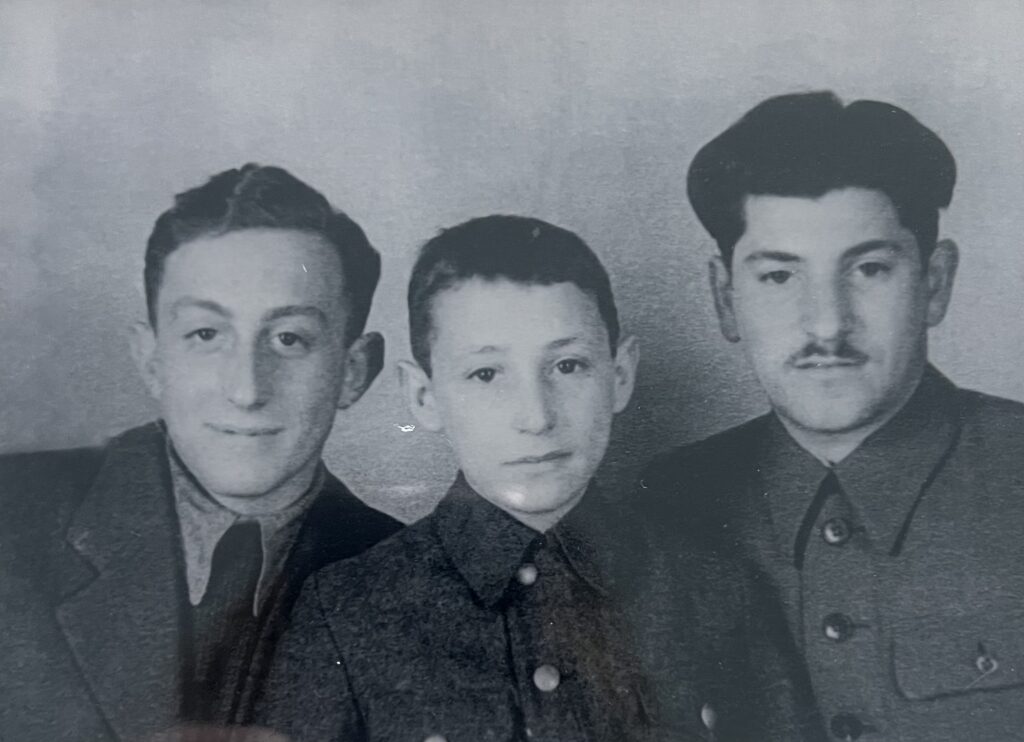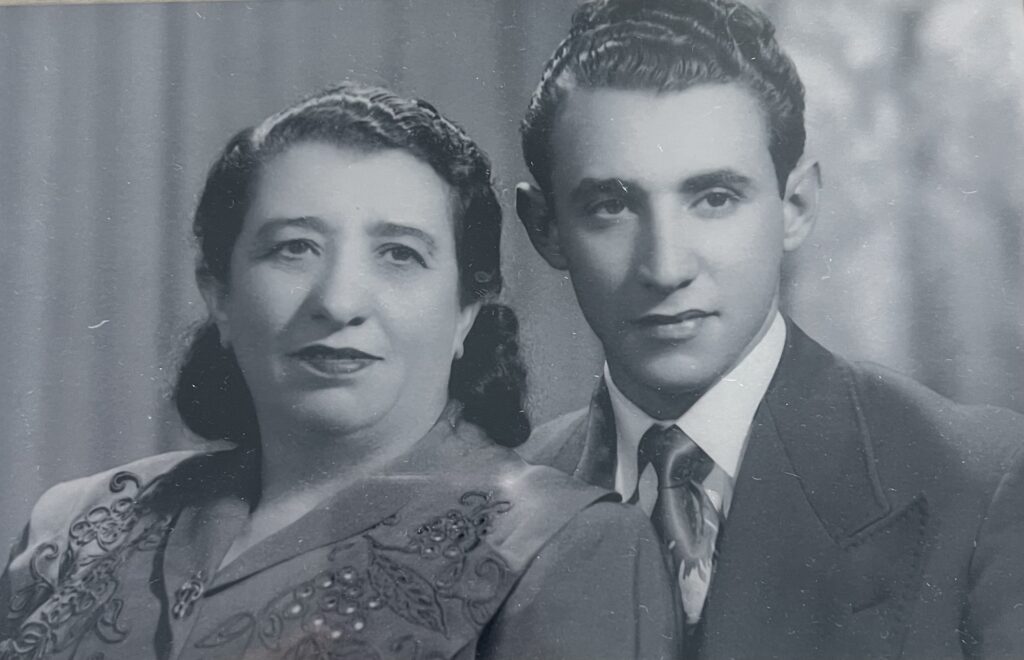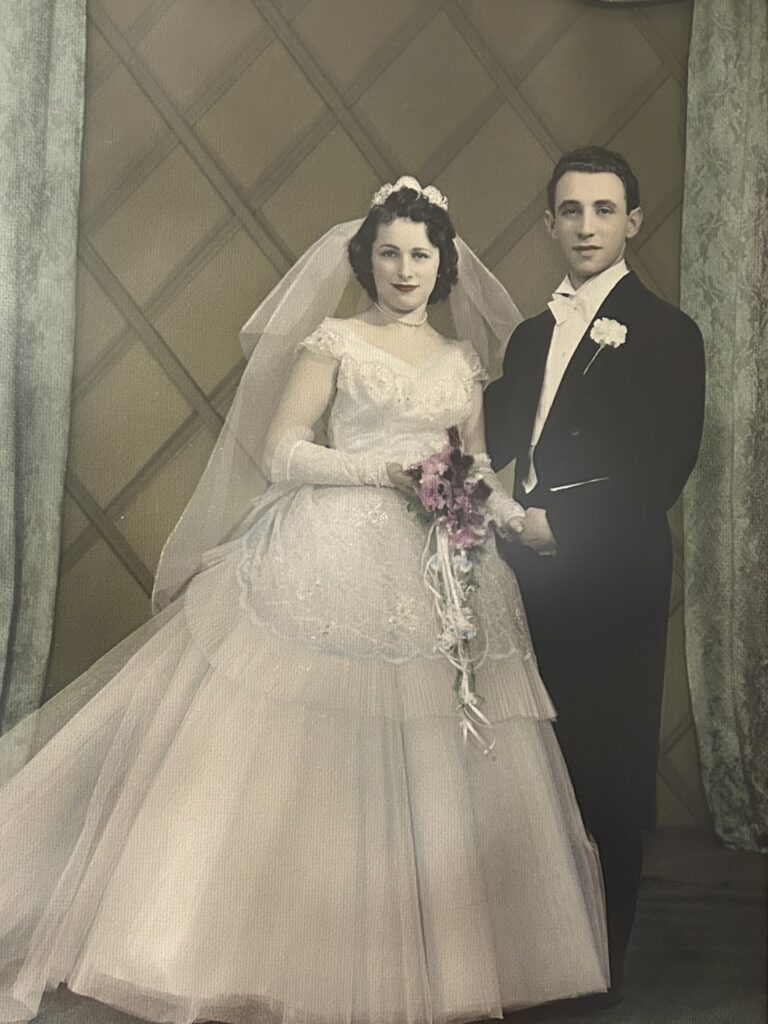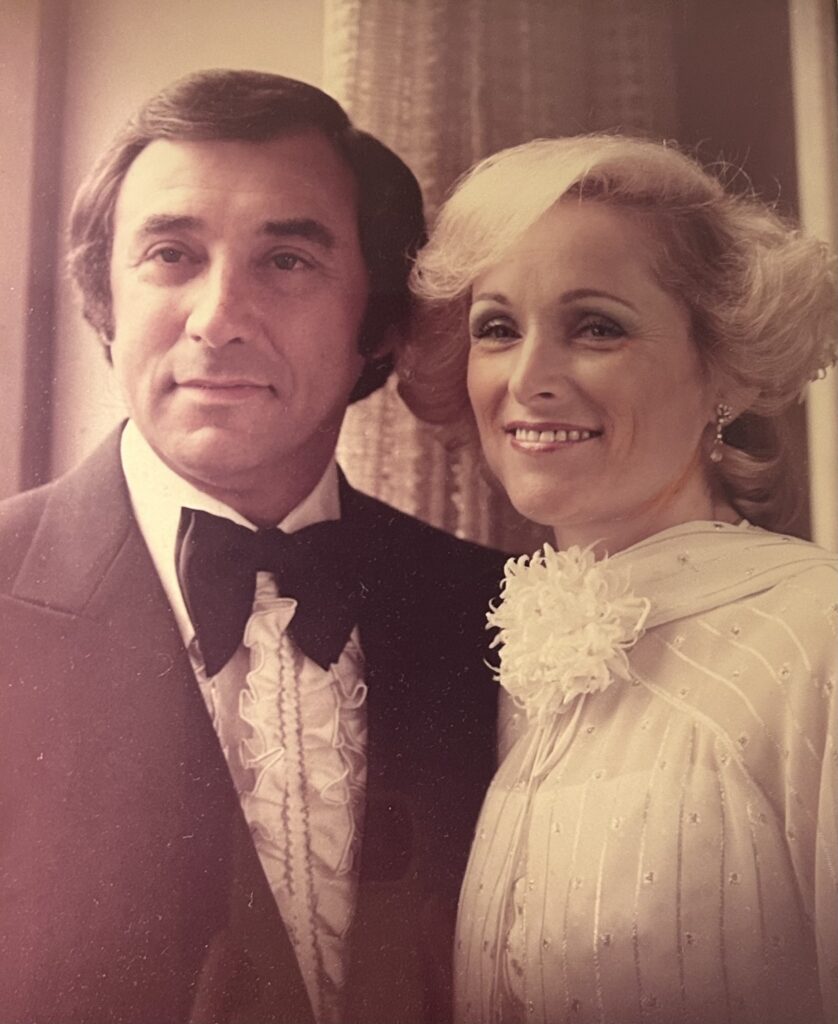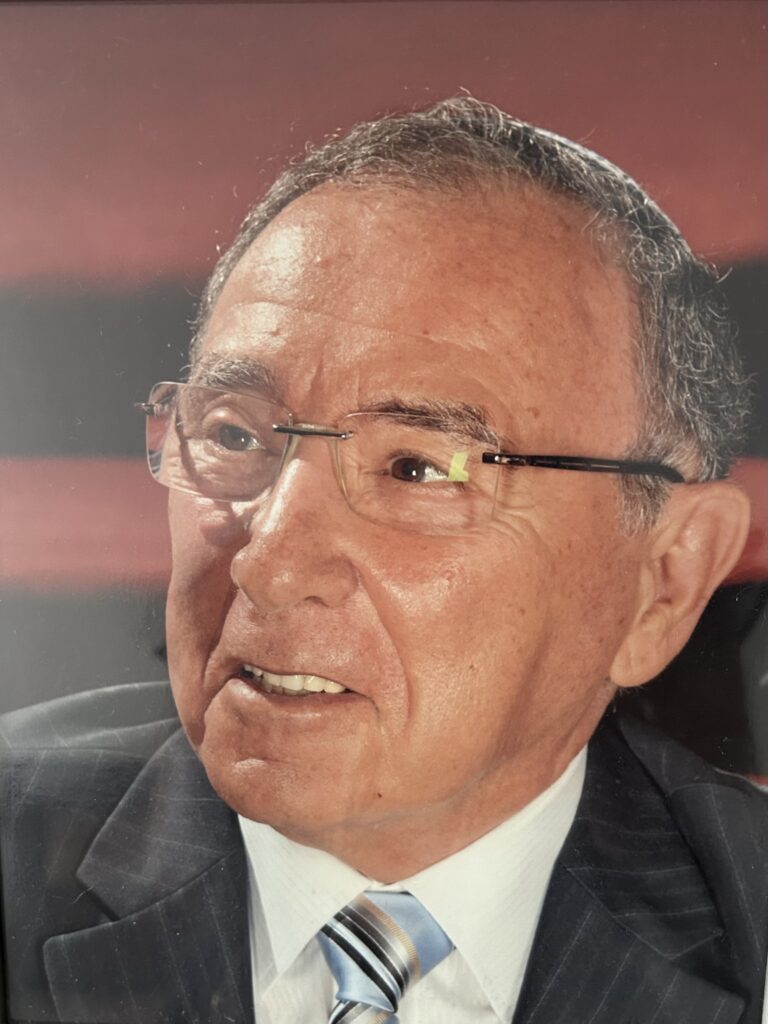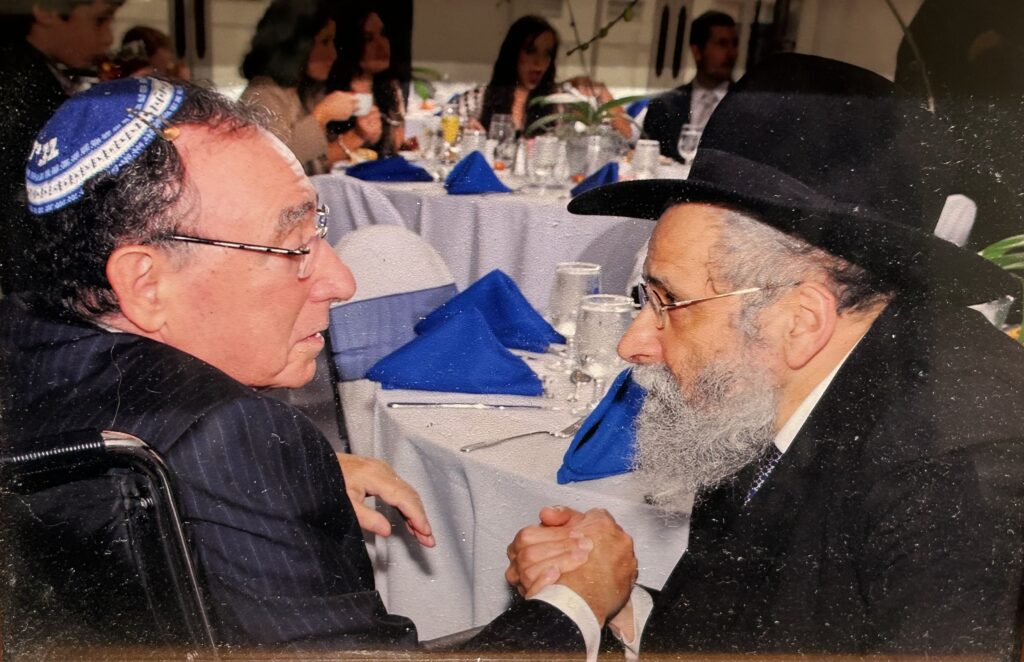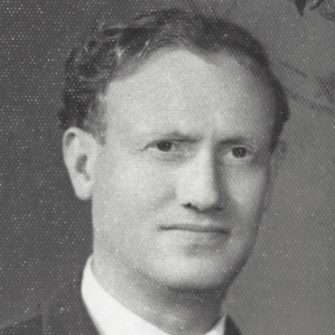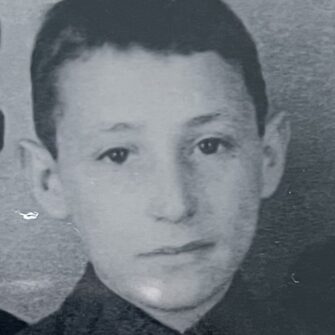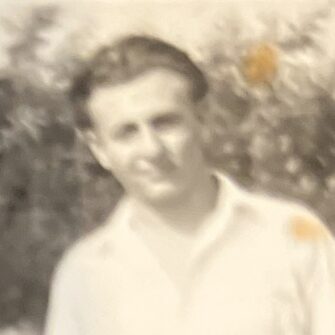Benjamin Bedzow (Bedzowski), was born on November 11, 1933 in the town of Lida, Poland, located in present-day Belarus. He lived with his parents, Michel and Chasia, along with three older siblings—Leah, Charles, and Sonia. His parents owned a large department store on the main street of town. Before the war stole his childhood, Benjamin had a happy, comfortable life and enjoyed playing with his friends.
Benjamin witnessed antisemitism in his town leading up to the war. He was often afraid of walking home from school, having seen other Jews attacked by their antisemitic neighbors. One day, the Bedzow’s store was defiled with the words “Don’t Buy From Jewish Stores.”
Benjamin attended Hebrew school until 1st grade, when his education was cut short by the war. On September 1, 1939, Germany invaded Poland. Under the Molotov-Ribbentrop Pact, signed in August 1939 by Nazi Germany and the Soviet Union, Poland was divided between the two powers. On September 17, the Soviets invaded Poland from the east. Benjamin watched with a child’s fascination as the Soviets marched through the main street of Lida.
Life changed under the Soviet occupation. The Bedzow’s store was confiscated by the Soviet authorities, who now controlled the economic life of Lida. There was a shortage of food, and essential items became commodities. During this time, the Bedzow family voluntarily opened their home to refugees fleeing from the German occupation in western and central Poland. For over a year, Benjamin’s parents provided food, shelter, and comfort to those in need.
In June 1941, life drastically changed once again. Germany broke the Molotov-Ribbentrop Pact and invaded the Soviet Union. Seven days before German troops entered Lida, Benjamin’s father died suddenly. The mourning Bedzow family was thrown from tragedy to tragedy.
Despite all the difficulties under the Soviets, no one was prepared for the brutality of the German occupation. The Germans bombarded Lida for multiple days. A curious child, Benjamin ran outside to watch from the outskirts of town as it was engulfed in flames. A few days later, German troops entered Lida. Benjamin’s maternal grandparents were visiting from Novogrudok for his father’s funeral. They took Benjamin back to Novogrudok with them, while his mother and siblings remained in Lida.
Novogrudok was also under German occupation. Not long after arriving, Benjamin witnessed a horrific event that left an indelible mark on his young mind. He was on his way to visit his aunt and uncle who also lived in Novogrudok. From where he stood, he could see down into the market square, where fifty young Jewish men were massacred. The Nazis forced Jews to wash the streets that ran with the young men’s blood. This was Benjamin’s first terrifying experience of Nazi brutality.
In early December 1941, Benjamin and his grandparents were awoken at four o’clock in the morning by a pounding on their door and shouting in German. They were forced out of their home into the bitter winter cold. They were led to the city’s courthouse, where the Jews of Novogrudok were being gathered for selections. The elderly and many women and children were taken away to their deaths, including Benjamin’s grandparents. Nine-year-old Benjamin managed to find his aunt in the crowded courthouse.
The survivors were marched by Nazi soldiers to the Novogrudok Ghetto. In the care of his aunt, Sarah Rachel, Benjamin survived the unbearable conditions by hiding in the blanket rolled up at the edge of the bed. In the middle of February 1942, Benjamin’s sister, Leah, snuck into the ghetto with a Christian friend to bring Benjamin back to Lida. It was an extremely dangerous journey, but Benjamin was overjoyed to be reunited with his family.
Benjamin and his family were forced into the crowded Lida Ghetto. They shared a small two-room apartment with other Jewish families. On May 8, 1942, the Nazis began liquidating the ghetto. During the selections, the Jews of Lida were divided into two groups. Those led to the right were taken away and murdered in mass graves. Those led to the left remained in the ghetto. Benjamin was miraculously selected for the left line, where he eventually found his family in the midst of panic and confusion.
Benjamin remained in the ghetto for nearly a year. In 1943, his family was given the opportunity to escape. Tuvia Bielski, commander of the famed Bielski Brigade, was a family friend of the Bedzows. Tuvia and his brothers formed an all-Jewish resistance unit in the forest and accepted all Jews into their group. Tuvia wrote to the Bedzow family and encouraged them to join the brigade. Benjamin’s older siblings went first, followed by Benjamin and his mother a few months later.
The Bedzow’s apartment was located on the border of the ghetto along the fence line. The partisans came under the cover of darkness to guide Benjamin and his mother. They crawled under the barbed wire fence on their hands and knees, careful not to draw the attention of Nazi guards. They ran until reaching the depths of the Naliboki Forest, where the Bielski partisans had built a camp to protect themselves and Jewish non-combatants. Benjamin was among the youngest members of the Bielski Brigade. Tuvia Bielski was a hero to Benjamin, having saved not only Benjamin’s life, but the lives of his family members.
In the summer of 1943, the Germans launched a manhunt to locate partisans in the Naliboki Forest. At this time, the Bielski Brigade had grown to approximately 700 people. To evade discovery, the brigade moved to a new location in a swampy area along the Niemen River, where they established their camp.
Everyone had a part to play in the Bielski Brigade. Benjamin, his mother, and Sonia helped with tasks around the camp to keep it running smoothly. Charles participated in missions of sabotage and ambush, while Leah helped guard the camp and went on food missions. Sonia volunteered for a mission to bring medicine back to the partisans from the Lida Ghetto. Tragically, she was caught and sent to the Treblinka Concentration Camp and where she was murdered.
In June 1944, the Bielski Brigade, which had increased to over 1,200 people, met the advancing Russian Army as they liberated the east. Benjamin, his mother, Leah, and Charles returned to Lida before moving to a Displaced Persons camp in Torino, Italy in 1946. In 1948, Benjamin and his mother immigrated to Montreal, Canada, followed later by Charles and Leah.
Benjamin began his new life in Montreal, Canada with determination and vision. He launched a career in real estate development that spanned North America in cities across Canada and the United States, focusing in Miami after moving there in 1978. Benjamin was active in his community and served as the Building Chairman of the Shul of Bal Harbor, a structure to replicate and resurrect three of the many synagogues destroyed by the Nazis.
Benjamin was a charismatic, energetic and optimistic friend and colleague to all who knew him, but above all else, he was a loving and devoted husband to his beautiful bride Bessie nee Eichler for 56 years, and exceptional father to his three girls, Hannah, Sarah and Marlene. As the family grew to include new “sons,” grandchildren, and great grandchildren, Benjamin extended his capacity to attend to each and everyone a brand of emotional support, bottom line advice, and tenacious love, uniquely Benny. He will be forever missed, admired and immensely loved, by his beloved Bessie, his champion, who lovingly cared for him with exceptional courage and dignity; by his children, Hannah and David Shear, Sarah and Marc Sheridan, and Marlene Weisleder, and by his grand and great grand children, Matthew, Ryan, Laura, Alexander, Carly, Chelsea, Joshua, Lindsay, Zachary, Holden and Armie. He was extremely proud of his family and forever grateful to Tuvia Bielski, who saved his life as a young boy. Benjamin passed away on December 12, 2011.

